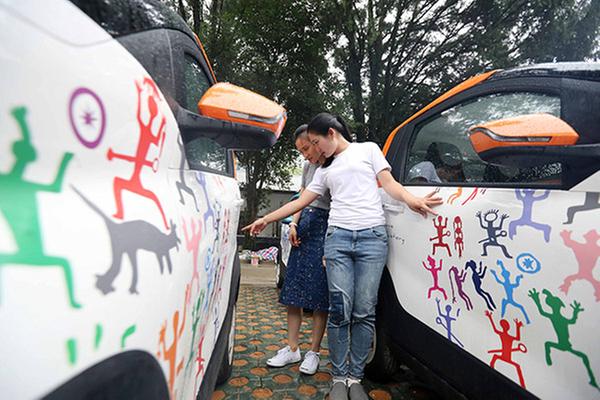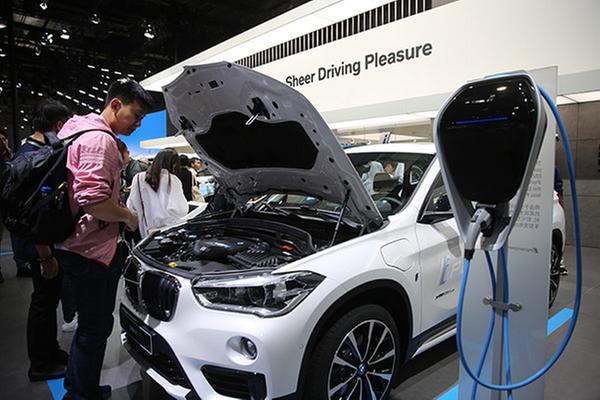Electric car sales dip due to customers' doubts

 |
| Colorful new energy cars catch residents' eyes in Rong'an county in Liuzhou, Guangxi Zhuang autonomous region. [Photo/China Daily] |
But China remains the largest market for new energy vehicles in terms of both sales and supporting infrastructure
Among the world's major auto markets, China takes pole position in demand for electric vehicles and is leading in absolute terms for related infrastructure, despite deliveries tumbling in the first quarter.
Electric vehicles are becoming an attractive alternative in China and Chinese customers have expressed overwhelmingly positive attitudes towards such vehicles, German consultancy company Roland Berger found in recently published research.
About 60 percent of the 1,002 Chinese respondents are considering buying an electric vehicle as their next car, much higher than the global average of 37 percent, as shown in the company's research conducted in 10 countries: China, France, Germany, India, Japan, the Netherlands, Singapore, South Korea, the United Kingdom and the United States.
Traditional carmakers and tech giants have invested a significant amount of funds into disruption technologies, including electrification, according to Johan Karlberg, a Shanghai-based partner at Roland Berger Greater China.
He said: "Regardless of how quickly this is going to happen, the fact that so many players are entering is definitely driving up the pace of change in the automotive industry". The share of full electric and plug-in electric hybrid vehicle models on the carmakers' product portfolios has surged in the past two years.
 |
| Electric cars are highlighted at this year's Shanghai auto show. [Photo/China Daily] |
Chinese manufacturers launched models that contributed 10 percent to the total market offering last year, second only to Germany, which topped the world with 12 percent.
Statistics show that China sold about 507,000 electric vehicles in 2016, more than double that of 2015.
The sales volume included about 409,000 full electric cars, and 98,000 plug-in hybrid electric vehicles.
The industry expected flattened but healthy development in the electric vehicle market, but deliveries in the first quarter were less positive than insiders' predictions.
Accumulative deliveries of 90,402 electric vehicles were registered during the period from January to April, dropping 0.2 percent over the last year, according to the Ministry of Industry and Information Technology.
Chinese observers have said the electric vehicle market is highly dependent on government policies and subsidies.
Nielsen, a market research company, found that potential buyers of electric vehicles are firstly interested in the free license plates, while the other major attraction is government subsidies.
Without the government subsidies, an ordinary electric car would be as pricey as a luxury car, but would provide a below-expectation user experience, according to Yale Zhang, general manager of Automotive Foresight (Shanghai).
"Buyers are basically paying for a power battery, as the battery in an electric car is so expensive that it makes up about half of the production cost," he said in an earlier interview.
"The electric car value diminishes much more speedily than a gasoline car after years of use, since the battery will be exhausted," Zhang added.
A Beijing customer told China Daily that he bought a 3-year-old JAC iEV5 for less than 50,000 yuan ($7,350) last year, but the previous owner paid about 90,000 yuan after enjoying government subsidies.
"I use it on very rare occasions. It's only for the electric car plate in the lucky draw in Beijing. I foresaw the quota of the electric car plate would be exceeded," he said.
The 51,000 quota for electric car plates in Beijing was fully used by April.
The remainder of the applicants will have to wait until February 2018 for the refreshed quota pool. The previous owner of the iEV5 viewed the vehicle as a white elephant and turned instead to the gasoline-powered family car.
A female user of a newly bought BAIC E160 EV returned the product and received a full refund from the dealer.
She drove the electric car to the parking lot under her apartment, but had no way to get it back onto street level.
"The tilted ramp has such a sharp angle that the electric car was unable to drive up to the end. The only solution was to call the tow truck," the seller told China Daily in anonymity.
"Despite being fully recharged, on every attempt it would stop in the middle as the battery output was not as strong as that of a gasoline car." The long ramp on the fourth ring road in Beijing also became a hazard for many electric vehicles when winter came.
Another electric car owner spent hundreds of yuan on towing services during the hard Beijing winter in 2015.
His Denza 400 failed to conquer the ramp when the electrometer showed about 30 percent battery life remained on that cold night, leaving him stranded halfway up.




































